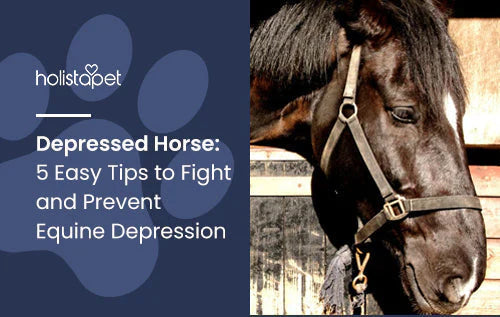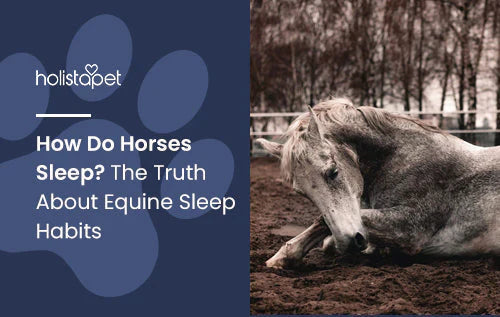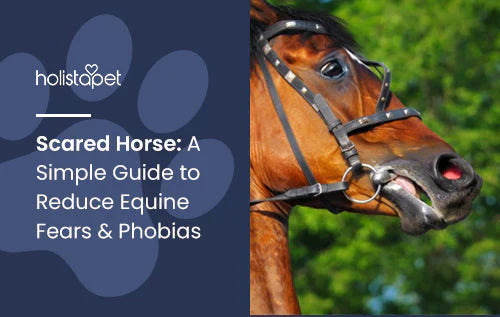A depressed horse may not be a common sight. Generally, we know horses to be tenacious, eager to please, and often social. However, these intelligent and emotionally complex creatures can experience depression just like humans. Since horses can't use words to communicate, it can be difficult to identify depression in these animals. This guide will explain how horses let us know they're feeling off and how we can help. By the end of this article, you'll be able to spot the signs of depression and know just what to do!
Can Horses Get Depressed?
Certainly. Research has shown that a horse may become depressed in much the same way a person might. Depression in horses causes them to feel withdrawn from life. One study showed that affected animals tended to tune out their surroundings. If this sounds similar to the human experience of depression, that's because it is. Many symptoms of human and equine depression overlap. However, keep in mind that this also means horses may be capable of the same happiness and lust for life that we are!
When it comes to equine mental health, it's essential to know your horse's personality. This will make it easier to prevent, spot, and treat depression. Since domesticated horses are more likely to be depressed than wild ones, it's a responsible equestrian responsibility to look after their steed's well-being.
Why Do Horses Get Depressed?
There is no single cause for equine depression, and the issue may be physical or mental. Even though horses live very different lives from us, they can be affected by the same things that cause us to feel depressed. Changes to their health, environment, or routine can cause a horse to become withdrawn.
You can take a withdrawn horse to a veterinarian, but depression alone may not be the cause of their symptoms. To help your vet determine whether there is a related illness, examine every aspect of your horse's daily life. This also aids them in prescribing the appropriate treatment. Depression usually causes the animal to stop engaging with its surroundings. Since a domesticated creature has little control over its life, it falls to the owner to make a change.

Why Is Depression Bad for Horses?
Do horses get sad? Depressed sad horse owners may notice a depressed equine lose its appetite, refuse to exercise, or no longer take pleasure in tasks it used to enjoy. Since these symptoms are linked to physical health, depression can cause the horse's body to deteriorate if these issues aren't addressed. Also, a withdrawn horse may exacerbate a health problem by refusing to eat or exercise. Signs of depression, like cribbing (gnawing) and weaving (swaying), can even create issues that did not exist before.
Why do horses look sad? Since one of the most common depressive tendencies is shutting out the environment, a withdrawn horse might not react appropriately to potentially dangerous situations. Staying alert during training is crucial for avoiding accidents like a rolled heel. Situational awareness also protects a horse from outside threats. If an equine's attention is elsewhere while riding or driving, it could be dangerous for the rider and the horse. This is especially important when beginner equestrians are involved.
Depressed Horse Signs & Symptoms
Each horse is an individual with its own personality and preferences. What may be signs of depression in one animal could merely be normal behavior for another. You'll need to get acquainted with your horse's personality so that you can easily spot signs of a deeper issue.
Every horse may be unique, but there are some common symptoms of depression that horse owners should keep an eye out for. These signs include:
- A withdrawn posture: Demonstrated by a lack of mobility. This may also be shown by facing a wall for long periods or an unfocused stare into the distance.
- Cribbing: A horse that is cribbing bites at its stall door, a fence post, or other hard objects. This can indicate boredom, nervousness, or an underlying health condition such as colic, all of which can contribute to depression. Cribbing for long periods can wear away at the horse's teeth.
- Weaving: Weaving means the horse sways back and forth in its stall. This is typically anxious behavior, and it could be a sign that your steed is depressed. Weaving can eventually result in uneven hoof wear.
-
Mood changes: Sudden skittishness or ferocity could mean that your horse is in a poor mental state. For example, an animal that used to sit calmly in its stall but now paces back and forth should be examined further.

- Loss of appetite: Many times, depression causes a horse to lose its appetite. This can result in unhealthy weight loss, which could, in turn, bring about other health conditions.
- No response to tactile stimulation: Horses are typically the touchy-feely type, literally. They are extremely receptive to petting, patting, and physical touch. A depressed horse might need its space, becoming less responsive to your touch.
RELATED: Scared Horse: A Simple Guide to Reduce Equine Fears & Phobias
How to Care for a Depressed Horse
After you study your horse's behavior, narrow down the areas of their life that could be adjusted. If it hesitates when entering its stall, try cleaning it out. Is a lack of appetite the biggest symptom of your steed's depression? Then try switching up its diet or changing its water more frequently.
We've gathered some tips for how to help your horse get back to its usual self. Feel free to try a few methods and combine techniques until you find a good solution for your equine. Whether the issue is a chronic illness or a lack of social interaction, first focus your attention on these areas.
Fresh Food & Water
Horses need a healthy diet and plenty of water. You can help your depressed horse by consulting a vet to determine the best roughage for the horse. There are many different blends of roughage, as well as grain or nutritional supplements, making food one of the most important factors in an equine's daily routine.
When it comes to water, there is an easy test to see whether it needs to be changed. If you wouldn't drink the water yourself, don't give it to your horse. Clean, refreshing H2O without any bacteria or parasites is crucial for the well-being of your horse.
CBD
If your horse is withdrawn due to discomfort or tension, cannabidiol may help. CBD promotes soothing feelings of tranquility by interacting with the animal's endocannabinoid system (ECS). The ECS is present in nearly all mammals, and it helps the body maintain its internal balance by regulating mood, digestion, pain responses, and more.
Mix some CBD oil into your horse's food, or drop some directly into its mouth. You can also introduce some CBD horse pellets into your steed's diet. Cannabidiol is a good option for those looking to improve their horse's performance and mental state.
Routine
Doing the same thing day in and day out may sound boring to some people, but horses thrive on routine. This doesn't mean they won't still enjoy riding new trails or meeting new individuals. But even in the wild, the horse is a creature of habit. Provide your steed with a daily schedule to give it a sense of comfort.
Exercise
A lack of exercise can cause depressive tendencies in both humans and horses. Try to incorporate your own exercise into training with your horse. This will satisfy both you and your horse's physical needs while also giving the animal social stimulation.
Preventing Horse Depression
Keeping horses busy and meeting their social, physical, and mental requirements are the best techniques for preventing depression. Long periods of isolation, a lack of exercise, and a disturbed routine can all affect your steed's mental state. Regular trips to a veterinarian are essential for quality horse care.
Plus, vet trips can help you stay ahead of any illnesses. Spotting a condition early greatly increases the chance of recovery. If you pay attention to your horse's body and behavior, you can catch signs and bring them to a vet for treatment. If you provide the best environment for your horse and they still exhibit symptoms of depression, they may be suffering from a physical problem.
Final Thoughts
Noticing a withdrawn posture or a behavior change? Horses can have an off day like anybody, so jump to conclusions right away, and don't blame yourself. First, examine their environment, then determine which areas of the animal's life could be improved upon.
With some experimentation, patience, and training, you'll see your exuberant steed again in no time. For all of your CBD and pet information needs, HolistaPet has you covered!
Read Next: BEST HOME REMEDIES FOR HORSE COLIC [FULL LIST]







![Probiotics For Dogs [Soft Chews] - HolistaPet](http://www.holistapet.com/cdn/shop/files/Probiotic-Infographic-1_472d7a29-e30c-435a-9638-1365d8c3a9f9.jpg?v=1725384841&width=104)




























Leave a comment
All comments are moderated before being published.
This site is protected by hCaptcha and the hCaptcha Privacy Policy and Terms of Service apply.